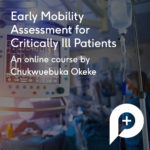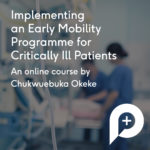Early mobility in critical care patients improve’s their functional mobility capacity, their physical functioning self-perception and their quadriceps muscle strength at discharge.
We know that early access to rehabilitation for people in critical care improves their liklihood of returning back to doing the things they love after leaving hospital. By providing early mobility to patients, even when on ventilation, we know that we dramatically improve thier recovery trajectory.
Even though there is a growing evidence base in the literature to support the safety and effectiveness of early mobilisation there is a divide between clinicians who use early mobilisation. This is because of barriers such as limited information about safe staffing levels, creating a culture which supports its use, low confidence levels of planning ealry mobilisation as well as access to equipment and resource.
Chukwuebuka Okeke is a clinical academic who works in the critical care setting. In two new courses on Physioplus, he takes you through the current evidence base around early mobility for critically ill patients and then how to implement an early mobility treatment plan for patients.
Early Mobility Assessment for Critically Ill Patients

As management of critically ill patients improves, more people are surviving critical illness episodes. However, prolonged stays in intensive care units have various negative effects including increased morbidity and mortality, decreased function and long term weakness. Early mobility programmes can help to address these complications, but patients need to be carefully assessed and monitored to ensure the safety of these programmes. This course introduces early mobility programmes and highlights key assessment points that must be undertaken prior to a mobility programme commencing.
Enhance Your Patients Prospects
Implementing an Early Mobility Programme for Critically Ill Patients

Early mobility programmes for critically ill patients have been found to improve outcomes across a range of measures, from length of hospital stay to functional status on discharge. They are safe and feasible to implement, but there are many perceived barriers to these programmes in intensive care units around the world. This course explores the benefits of early mobility programmes and discusses the implementation of these programmes for patients in intensive care settings.
Prevent the Negative Effects of Critical Care
 As management of critically ill patients improves, more people are surviving critical illness episodes. However, prolonged stays in intensive care units have various negative effects including increased morbidity and mortality, decreased function and long term weakness. Early mobility programmes can help to address these complications, but patients need to be carefully assessed and monitored to ensure the safety of these programmes. This course introduces early mobility programmes and highlights key assessment points that must be undertaken prior to a mobility programme commencing.
As management of critically ill patients improves, more people are surviving critical illness episodes. However, prolonged stays in intensive care units have various negative effects including increased morbidity and mortality, decreased function and long term weakness. Early mobility programmes can help to address these complications, but patients need to be carefully assessed and monitored to ensure the safety of these programmes. This course introduces early mobility programmes and highlights key assessment points that must be undertaken prior to a mobility programme commencing.
 Early mobility programmes for critically ill patients have been found to improve outcomes across a range of measures, from length of hospital stay to functional status on discharge. They are safe and feasible to implement, but there are many perceived barriers to these programmes in intensive care units around the world. This course explores the benefits of early mobility programmes and discusses the implementation of these programmes for patients in intensive care settings.
Early mobility programmes for critically ill patients have been found to improve outcomes across a range of measures, from length of hospital stay to functional status on discharge. They are safe and feasible to implement, but there are many perceived barriers to these programmes in intensive care units around the world. This course explores the benefits of early mobility programmes and discusses the implementation of these programmes for patients in intensive care settings.